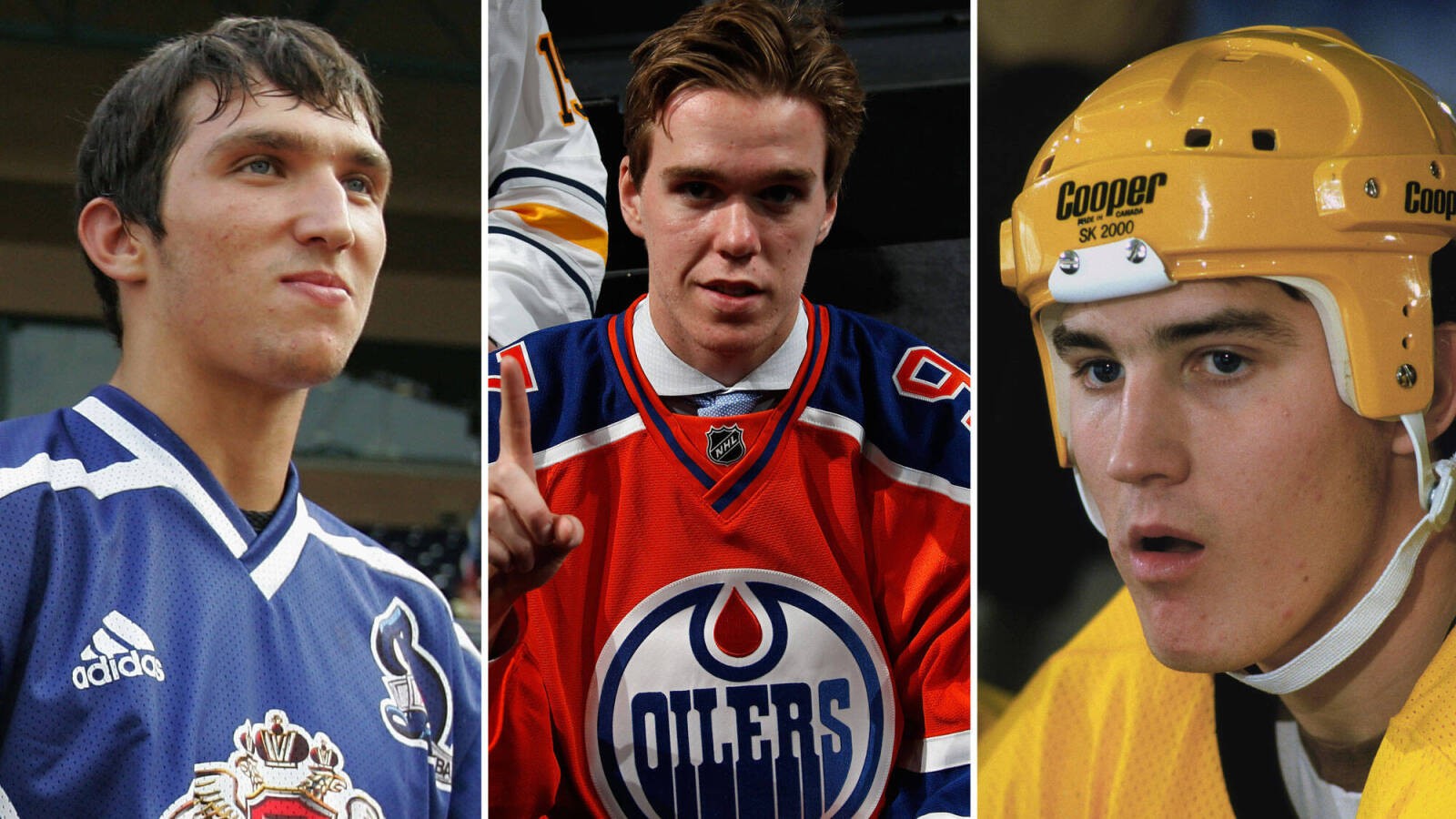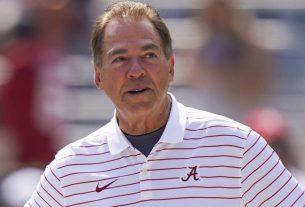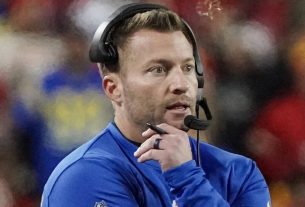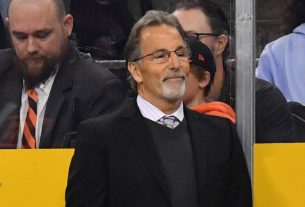Being the first-overall pick in any draft is a true achievement, as this is usually the most sought-after player available to teams. Sometimes, these picks work out great, and a new franchise player is found. Other times, a first-overall pick is a miss — perhaps even a straight-up bust. Here is every player who was drafted with the first pick in the NHL Draft. We’re starting with the most recent draft and moving back to the first draft back in 1963, when there were only six NHL teams. Let’s take a trip down memory lane, even if the memories will be painful for some of these teams.
David Kirouac/USA TODAY Sports
For a couple years, the buzz was that this would be the Shane Wright Draft, but Wright was always seen as more of a high-floor, medium-ceiling guy. In the end, Wright went fourth, and Slafkovsky ended up going first overall. As a teenager, he’s jumped right into the lineup for the rebuilding Canadiens. So far, he hasn’t looked in over his head. Interestingly, paired with Simon Nemec, the first two picks in 2022 were both from Slovakia.
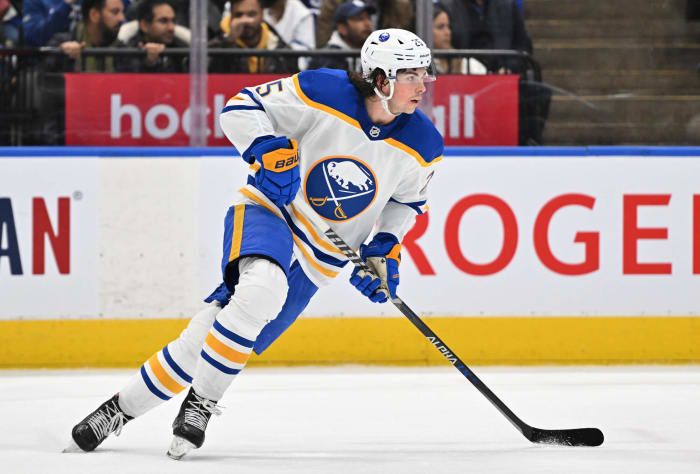
Dan Hamilton/USA TODAY Sports
It was a big draft for the University of Michigan in 2021. Three players in the top five were members of the Wolverines squad, and Luke Hughes was drafted fourth overall as a Michigan recruit who was going to go play college hockey in lieu of going directly to the NHL. Power, though, was the first one of that quarter picked. He spent his draft season back at Michigan, leading it to the Frozen Four, but the smooth-skating defenseman, who also stands 6’6” for good measure, is now entrenched on the Buffalo blue line.

Danny Wild/USA TODAY Sports
The buzz around Lafreniere was so high that some accused the NHL of rigging the NHL Draft lottery in order to get him to New York. Thus far, the concerns have proven a little overcooked. Now, Lafreniere is still young, but he has yet to emerge as the kind of offensive player many imagined. Perhaps getting drafted to a team that was already laden with talent didn’t help, as he often plays third-line minutes and has yet to find a role on the power play.
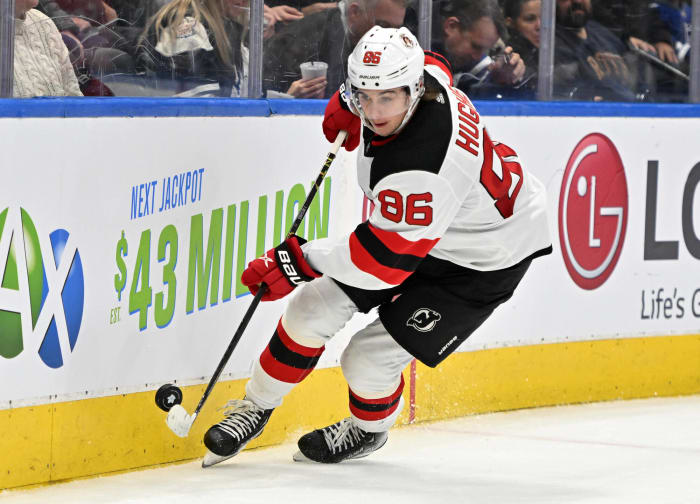
Dan Hamilton/USA TODAY Sports
Sandwiched between the defenseman in the Hughes family, Quinn and Luke, there’s Jack. Jack was also the one who was drafted first overall, even though the Devils had taken Nico Hischier two years prior. Slightly undersized, Hughes’ rookie campaign was rough. However, he has since emerged as an elite offensive player in his early twenties. During the 2021-22 season he had 26 goals and 56 points in 49 games. As he puts more muscle on his frame, he should have an easier time staying on the ice.

James Guillory/USA TODAY Sports
Normally, a defenseman that teams are really excited about at the top of the draft is rare. That made Dahlin feel pretty special. It’s not too often a blue liner debuts as an 18-year-old, but the Swedish stud managed to pull that off for the Sabres. Even more impressively, he didn’t look out of place, as he notched 44 points, making him only the fifth 18-year-old defenseman to tally at least 30 points.
6 of 60
2017: Nico Hischier, C, New Jersey Devils

Bob DeChiara/USA TODAY Sports
Some drafts have an obvious first pick, while others don’t have a player who really stands out. The 2017 draft was one of the latter, but the Devils probably don’t have many complaints. Hischier scored 20 goals as a rookie and had 49 points in his sophomore season even though he played in only 69 games.

Tom Szczerbowski/USA TODAY Sports
The Maple Leafs finally found their next potential cornerstone center…and he’s a guy who grew up playing hockey in Arizona. Not that Toronto cares, given how Matthews has performed since debuting. He won the Calder Trophy after scoring 40 goals as a rookie, and last season he tallied a career-high 73 points in only 68 games.

Stephen R. Sylvanie/USA TODAY Sports
Some draft prospects get you excited, but some send you through the roof. McDavid was so sought after that teams were falling over themselves in hopes of being able to draft him. The speedy youngster has not disappointed. Some people think he’s already the best player in the NHL, and they have a lot to evidence to support that claim. He’s played in only four seasons, but he already has two Art Ross Trophies. More are likely to come.
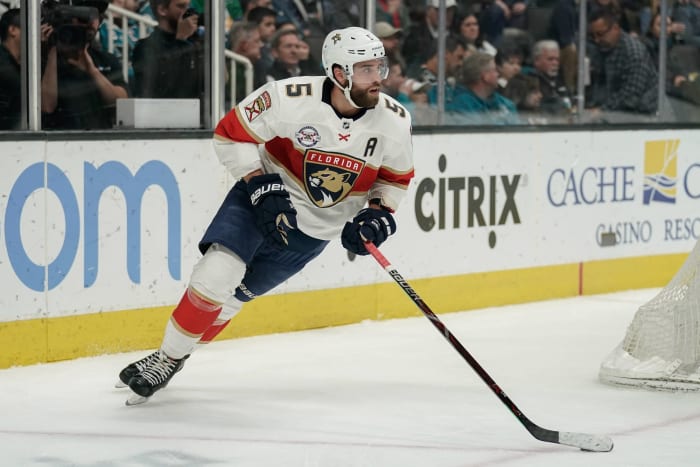
Stan Szeto/USA TODAY Sports
There were a lot of solid players in this draft, but nobody has turned out great enough to make Ekblad look like a mistake with the first-overall pick. He was the first defenseman to be the top pick in several seasons, but it’s paid off. He’s never failed to register double-digit goals in a season, and he won the Calder Trophy and made the All-Star Game in his first campaign.

Ron Chenoy/USA TODAY Sports
MacKinnon came out of the gates on fire with a Calder-winning rookie season. However, he followed that with a sophomore slump that ended up turning into a couple of down years. Fortunately for the Avalanche, he’s turned things around the last couple of seasons. He’s had 97 and 99 points in his last two years, and now he looks like one of the best forwards in the NHL.

Sergei Belski/USA TODAY Sports
And we’ve reached our first bust. Honestly, Yakupov’s first season was his best, as he managed 17 goals and 31 points in 48 games. He never really clicked and ended up leaving Edmonton for short stints with the Blues and Avalanche. Now he plies his trade in the KHL. The Russian is only 25, but it seems like his NHL career is done.

Marc DesRosiers/USA TODAY Sports
Nugent-Hopkins exists in a weird limbo. He’s not a bust, but he also probably wasn’t deserving of being the first-overall pick. The Nuge is a solid player but not a franchise changer. However, he just set personal bests with 28 goals and 69 points, and he seems about ready to enter his prime.

Vincent Carchietta/USA TODAY Sports
Yes, the Oilers did indeed have three first-overall picks in a row. Hall is the best player of the three, so naturally Edmonton traded him for an unremarkable defenseman in Adam Larsson. In his second season with the Devils, Hall notched 93 points and won the Hart Trophy in leading the Devils to the playoffs. Unfortunately for the Oilers, there are no mulligans on trades.

Brad Penner/USA TODAY Sports
Tavares was being hyped as the next big thing for a while. In fact, the OHL, a junior league in Canada, created the concept of “exceptional player status” so that Tavares could debut in the league at 14 instead of 15. He’s been a great player but perhaps not quite to that level of hype. While he’s made six All-Star Games, he’s never won an Art Ross or a Hart, and he’s never had a 100-point season.

John E. Sokolowski/USA TODAY Sports
It feels like Stamkos has gotten lost in the shuffle of great players in the NHL. In fact, he’s not even considered the best player on his team anymore, thanks to the emergence of Nikita Kucherov. That’s unfair to Stamkos’ skills though. He has two 50-goal seasons and one 60-goal season. Only 30 players in NHL history can claim to have done that.

Dan Hamilton-USA TODAY Sports
Kane, despite his tremendous skills, still felt like a slight gamble with the first-overall pick, given that he’s on the smaller side for an NHL player. If he was a gamble, he’s paid off big time. Kane was a key cog in the Blackhawks team that won Chicago’s first Stanley Cup since 1961. In fact, he’s helped them to three Cups, one for which he won a Conn Smythe Trophy. Kane was also the first American to win the Art Ross.

Stan Szeto/USA TODAY Sports
Johnson isn’t really a bust, as he’s had a long, fairly successful career. He’s just never really been any better than “good.” Currently with the Avalanche, he has made only one All-Star Game, and he’s never had more than 39 points in a season.

Charles LeClaire/USA TODAY Sports
Because there was no NHL season prior to the 2005 NHL Draft — thanks, Gary Bettman — the league had a massive lottery to decide who was going to get the chance to draft Crosby. He was being hyped as the next Wayne Gretzky; the next face of the NHL. Sid the Kid isn’t Gretzky — that was hyperbole — but he has become the face of the league. Two Hart Trophies. Two Conn Smythes. Three Stanley Cups. A future spot in the Hall of Fame all locked up. Crosby is the kind of player who makes teams dream of getting the first-overall pick.

James Guillory/USA TODAY Sports
Ovechkin didn’t get the hype of Crosby, but maybe just because he was Russian and not Canadian. In Ovechkin, the Caps got the best goal scorer of his generation. He’s led the league in goals a whopping eight times and could finish his career with over 800 if everything breaks right. Oh, and he led Washington to its first-ever Stanley Cup.

Don Wright/USA TODAY Sports
These days only elite goalie prospects get drafted in the first round, and honestly we will probably never see a goalie go first overall again. That makes Fleury a piece of history. On the one hand, he has a career .913 save percentage, which isn’t great. On the other hand, he was a goalie on three Cup-winning teams. Call it a wash in Pittsburgh, though Vegas has seemed quite happy with him as its first franchise goalie.

Aaron Doster/USA TODAY Sports
The Jackets were a fresh franchise when they got their first chance to draft a franchise player. Nash left a complicated legacy in Columbus. He was clearly the Blue Jackets’ best player, routinely crossing the 30-goal mark. However, they only made the playoffs once in his time there, getting swept in the process. Few people in Columbus complained when he was dealt to the Rangers. That being said, he scored 437 goals before injuries ended his career early. That’s a player who earned being the top pick.

George Bridges/KRT
Speaking of guys with complicated legacies drafted by expansion franchises. Kovalchuk was a sniper for the Thrashers, racking up over 50 goals a couple of times. He also got to the playoffs just once, and the Thrashers were swept. Then he signed an insane contract with the Devils, and New Jersey made it to the Stanley Cup Final. He then abruptly “retired” from the NHL to play in the KHL, though he returned to the Kings last season.
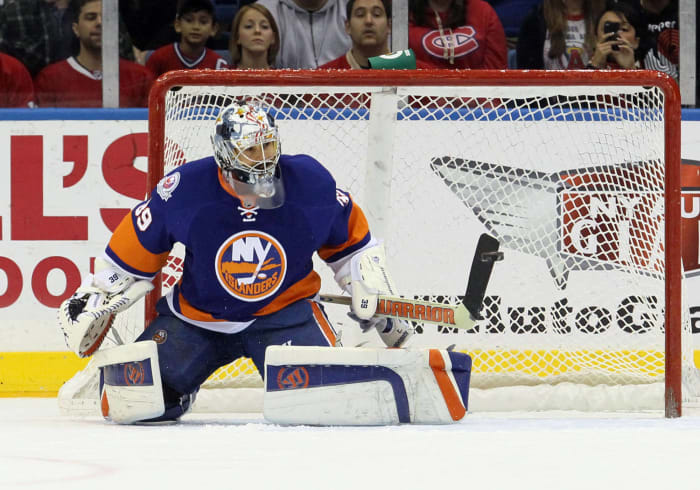
Jim McIsaac/Newsday/MCT/Sipa USA
When the Islanders took DiPietro first overall, it was the first time a goalie had gotten that honor in decades. He’s also an example of why teams have been, and continue to be, hesitant to take netminders that early. DiPietro retired with a 2.87 GAA and .902 save percentage, and he played the bulk of his career in a defensive-heavy time for the NHL. The Islanders gambled on DiPietro, and he turned into a bust.

GEORGE BRIDGES/KRT
That being said, DiPietro looks like a future Hall of Famer compared to Stefan. Prior to Yakupov, Stefan was the poster boy for busts in the new millennium. While he did suffer through a lot of injuries, which wasn’t his fault, Stefan didn’t do much even when he played. He never had more than 14 goals in a season and retired with 64 career goals.

Chuck Myers/MCT/Sipa USA
The Lightning went all in on Lecavalier when they drafted him, making him the captain at 19 years old. He was the first true franchise player in Tampa’s history, though it took the arrival of Martin St. Louis to really turn the organization around. That being said, he helped lead the Lightning to their first Cup in franchise history, and the team retired his number. That seems to indicate that Tampa was happy with its selection.

Jeff Curry/USA TODAY Sports
It still feels crazy that the Bruins traded Thornton to the Sharks. He had some really good years in Boston, including a 108-point season. The year he got dealt, Jumbo Joe won the Hart Trophy, and he’s become a legend in San Jose. Thornton hasn’t gotten that Cup yet, and he likely never will, but he’s a Hall of Famer who could retire with 1,500 career points if he plays another year.

Harry E. Walker/MCT/Sipa USA
It’s hard to call Phillips a bust, given that he played in almost 1,200 career regular-season games. The problem is that he was a defensively minded defenseman, which is a weird kind of player to take first overall. He didn’t rack up many points, but he played sound defense and spent his entire career with the Senators.

Bruce Bennett/Getty Images
Berard was drafted by the Senators but never played a game for them. Instead, he was dealt to the Islanders and won the Calder Trophy. After that he never reached those same heights, had some injury issues, bounced around a lot and retired after a year in the KHL. The Senators got Wade Redden and Damian Rhodes for Berard. Feels like they won that trade.

Joel Auerbach/Getty Images
Well this was quite a run on defensemen. None of these three ended up with careers worthy of being the first-overall pick, which may explain why defensemen have been the top pick less frequently in the intervening years. That being said, Jovanovski was the best of the bunch. He tallied 500 career points exactly, threw some big hits and made five All-Star teams.
30 of 60
1993: Alexandre Daigle, C, Ottawa Senators

Elsa Hasch/Allsport
When you talk about NHL busts, the first name on almost everybody’s lips is “Alexandre Daigle.” The Senators purportedly tanked to get him, which is why the NHL started using a draft lottery. He did once score 26 goals in a season. That’s good! Of course, he finished his career with 129 goals and 327 points, and he finished with more seasons of single-digit goals than double-digit goals. Truly, he was a bust.

Elsa Hasch/Allsport
So over five years, we got four defenseman going first overall and Alexandre Daigle. Not a great stretch for the NHL. Hamrlik had a solid journeyman career, and he did once tally 16 goals and 65 points in a season. Nobody would say that Hamrlik was a bad player or a bust. He played in almost 1,400 games, after all. The Czech defenseman was just never a truly great blue liner.

Denis Brodeur/NHLI via Getty Images
Lindros infamously refused to play for the Nordiques, getting traded to the Flyers. He also infamously got in a lot of scraps with the Flyers over his concussion issues. Of course, history is very much on Lindros’ side on that one, and it’s a shame his head injuries hindered his career. And yet he still made it to the Hall of Fame, thanks to the fact he tallied 865 points in 760 games. Lindros had both a great career and a “what could have been?” career.
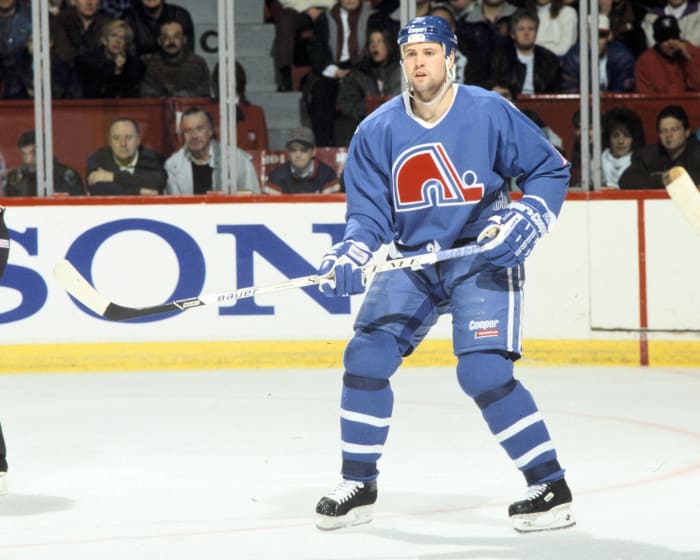
Denis Brodeur/NHLI via Getty Images
Nolan was born in Northern Ireland, which is a fun fact. He was also another really good, but never great, journeyman, though he did spend a bunch of years in San Jose. The big forward had two 40-goal seasons and finished with 422 career goals in 1,200 games.

Denis Brodeur/NHLI via Getty Images
Yes, the Nordiques had three first-overall picks in a row. None of the three ended up synonymous with Quebec, and two of them became franchise cornerstones elsewhere. And we wonder why the team ended up having to head off to Denver. Sundin is beloved in Toronto, and with good reason. The Swede is a Hall of Famer who had his number retired by the Leafs, and he ranks in the top 30 in career points despite playing so much of his career in the trap era.

Glenn James/NHLI via Getty Images
Modano went with the team from Minnesota to Dallas, and the only bummer is that he spent one season with his hometown Red Wings before he retired. He’s arguably the greatest American player of all time, he does have more goals and points than any other American and he’s definitely the best player in the history of the Stars.
36 of 60
1987: Pierre Turgeon, C, Buffalo Sabres

B Bennett/Getty Images
Turgeon is probably a bit underrated. He had a 106-point season in Buffalo and later a 132-point campaign with the Islanders. It’s a bit of a dubious “honor,” but Turgeon has more points than any eligible player not in the Hall of Fame. Because he was never considered a transcendent star and his only hardware was a Lady Byng, he may not make it. That doesn’t mean he wasn’t a great player.

Rick Stewart/Getty Images
Murphy created trouble basically wherever he went in the NHL, which certainly didn’t do him any favors in getting his career going. He did not stay in Detroit long, and he played in only 779 games, notching 528 career points. He had some seasons that would look great in a different era, but Murphy played in an offensively charged time. Alas, Murphy was a bit of a bust, especially with the Wings.
38 of 60
1985: Wendel Clark, LW/D, Toronto Maple Leafs
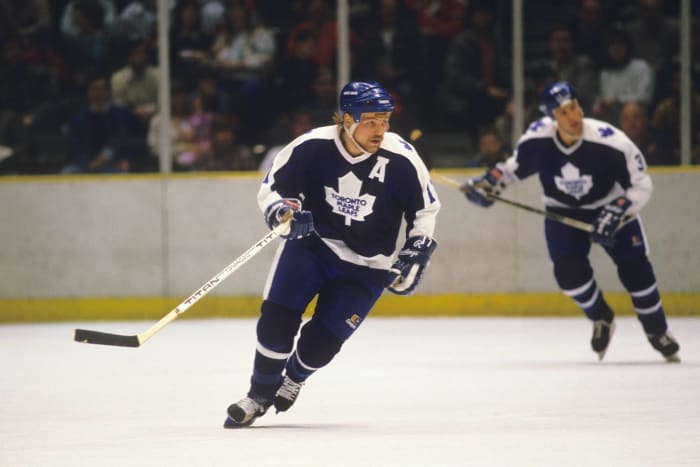
B Bennett/Getty Images
Clark was drafted as a defenseman, but he was pretty much immediately converted to forward. That seemed to work out, as he scored 330 goals in his career. On the other hand, Clark is more of a cult hero than a truly great player. He finished with 564 points in 793 games. People liked him because he got in fights and was captain of the Leafs for a while. Would it be heresy to say Clark wasn’t worth being taken first overall? Perhaps, and we’ll definitely be afraid to step foot in Toronto for a little while.
39 of 60
1984: Mario Lemieux, C, Pittsburgh Penguins

Allsport/Allsport
There will be no talks of busts here. Lemieux is one of the greatest players in NHL history. He made hockey in Pittsburgh, and then as an owner he saved hockey in Pittsburgh. Super Mario was an incredibly exciting player to watch, and he has some of the gaudiest numbers of anybody. Fans legitimately talked about whether or not he or Wayne Gretzky was better. While we have to go with “The Great One,” the fact it wasn’t an insane conversation says it all.
40 of 60
1983: Brian Lawton, C, Minnesota North Stars

Bruce Bennett Studios via Getty Images Studios/Getty Images
Lawton has the distinction of being the first American player taken with the first pick in the NHL Draft. He was also drafted right out of high school, and no other NHL player can make that claim. Oh, and he was also a bust: Lawton finished with 266 career points in 483 games. And now we know why high schoolers don’t get drafted first overall anymore.
41 of 60
1982: Gord Kluzak, D, Boston Bruins

Steve Babineau/NHLI via Getty Images
Kluzak is a bust with an asterisk. He played in only 299 NHL games, all with the Bruins. He also had a ton of knee injuries, going back to his junior hockey days. Kluzak missed two full seasons with knee issues and retired at 27 because of injuries. We won’t call Kluzak a bust; but we’ll call him a player who didn’t pan out through no fault of his own. For all we know, he’s the Greg Oden of the NHL.

Denis Brodeur/NHLI via Getty Images
Hawerchuk was a bit of an iron man, and he hit the NHL at a young age. That’s, evidently, how he became the first player to appear in 1,000 games before turning 31. A weird quirk of a stat? Sure, so let’s highlight some other ones that matter more. Hawerchuk won the Calder, made five All-Star teams and retired with over 500 career goals. That was enough to get him into the Hall of Fame and to get his number retired by the Phoenix Coyotes, who, of course, were the Winnipeg Jets once upon a time.
43 of 60
1980: Doug Wickenheiser, C, Montreal Canadiens
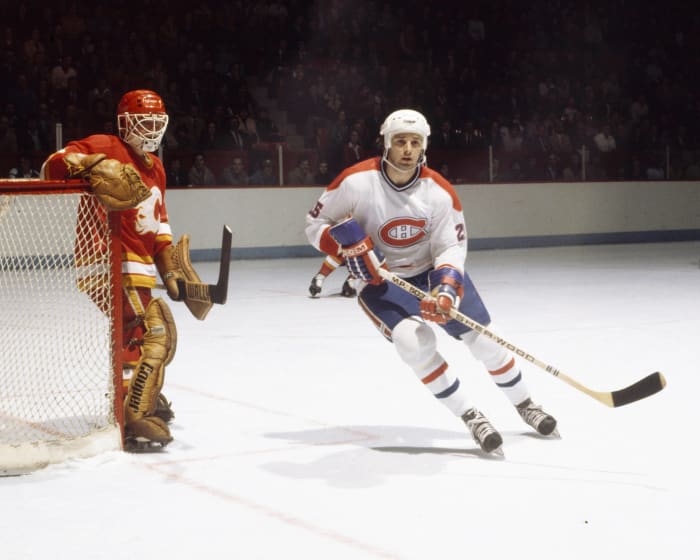
Denis Brodeur/NHLI via Getty Images
Wickenheiser didn’t quite pan out. He had one good season in Montreal, one good campaign with the Blues and then spent the end of his career kicking around in the minors. If the last name Wickenheiser seems familiar, his cousin Hayley is perhaps the best women’s player of all time.
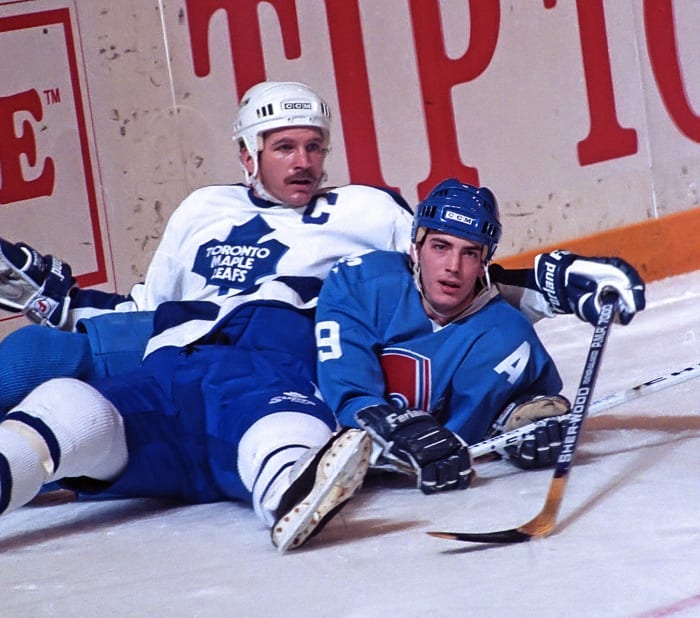
Graig Abel/Getty Images
We didn’t actually dip into the MLB Draft. There once was an NHL team called the Colorado Rockies. You know them now as the New Jersey Devils. Anyway, Ramage was a pretty good defenseman, best known for racking up A TON of penalty minutes. The dude liked to fight, although he had enough offensive skill not to be a bust.
45 of 60
1978: Bobby Smith, C, Minnesota North Stars

Denis Brodeur/NHLI via Getty Images
Smith had a bit of an under-the-radar career. He won the Calder with the North Stars, which is about as good of a start as a career can get off to. Smith also was known as a strong defensive forward, at least by reputation, in addition to his scoring acumen. In between Minnesota and Montreal, Smith tallied 1,036 points in 1,077 games. Granted, it was in the high-scoring ‘80s and early ‘90s, but he was still a good player — maybe not the ideal first-overall pick, but an acceptable selection in hindsight.
46 of 60
1977: Dale McCourt, C, Detroit Red Wings
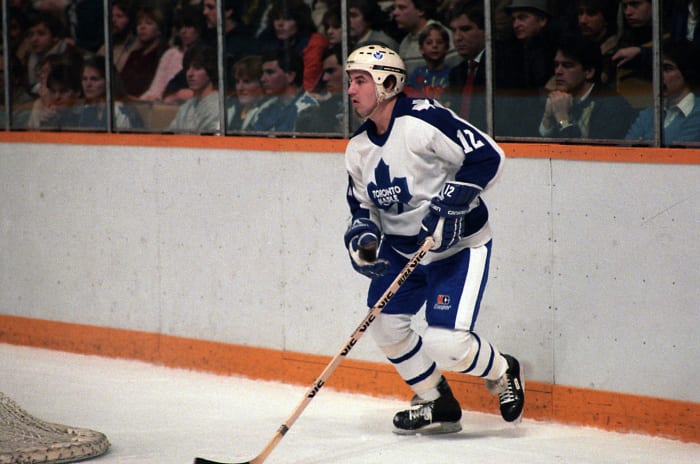
Graig Abel Collection/Getty Images
McCourt came out of the gate with 33 goals as a rookie, and he had a few good years with the Wings. He was even the captain for a season. Then they abruptly traded him to Buffalo. After a couple of years with the Sabres, and one with the Maple Leafs, he somewhat oddly headed off to Switzerland to play six seasons there. His Swiss team actually retired his number, but “Swiss League glory” is not usually what teams want from the top pick.
47 of 60
1976: Rick Green, D, Washington Capitals

Steve Babineau/NHLI via Getty Images
Green never had a double-digit goal season, scoring only 43 in his career. The defenseman did have one 40-point season in Washington, but for his last handful of seasons he was just hanging on to his career. Even when he was playing with some great Canadiens teams, he didn’t do a ton. Feels like a bit of a bust.

Steve Babineau/NHLI via Getty Images
Bridgman’s biggest claim to fame may be that he was the first general manager in Ottawa Senators history. He racked up a bunch of 50-point seasons in his career but also a lot of penalties. As a Flyer he was a secondary member of the “Broad Street Bullies.” He also once had 87 points in a campaign. The early days of the NHL Draft were a bit of a crapshoot — there were a lot more busts and a lot less great value picks — so relatively speaking Bridgman had a decent career for a first-overall pick.
49 of 60
1974: Greg Joly, D, Washington Capitals

Steve Babineau/NHLI via Getty Images
When Joly was drafted, the GM of the Capitals called him “the next Bobby Orr.” He finished his career with 97 points. By any measure, Joly is one of the bigger busts in NHL Draft history. He ended up playing more games in the AHL than the NHL.
50 of 60
1973: Denis Potvin, D, New York Islanders

Denis Brodeur/NHLI via Getty Images
The Islanders were still a new team at this time, but drafting guys like Potvin helped to turn them into the dynasty of the ‘80s. Potvin made such an impact on the NHL that Rangers fans still chant “Potvin sucks!” from time to time. He doesn’t mind, we assume, given his track record. Potvin won three Norris Trophies and was the first defenseman to tally 1,000 points in his career.
51 of 60
1972: Billy Harris, RW, New York Islanders

Steve Babineau/NHLI via Getty Images
Potvin was a great pick for the Islanders, and Harris, the first pick in the history of the franchise, worked out OK. He was a fine player, as he had over 20 goals in his six seasons on Long Island but was then traded to the Kings in 1980, the first of four seasons the Islanders won the Stanley Cup. Harris missed out on all of that.
52 of 60
1971: Guy Lafleur, RW, Montreal Canadiens

Steve Babineau/NHLI via Getty Images
He’s a fun fact. This pick was supposed to go to the California Golden Seals. However, the owner of the Seals traded the pick prior to the 1970 NHL Draft to get the Canadiens’ 1970 first-round pick. The Canadiens used it on Lafleur, who became a Hall of Famer and Montreal legend. The Seals had to move to Cleveland and then became the last major North American sports team to fold. One wonders what would have happened had the Golden Seals gotten the chance to take Lafleur.
53 of 60
1970: Gilbert Perreault, C, Buffalo Sabres

Denis Brodeur/NHLI via Getty Images
Perreault was the first player ever taken by the Sabres. He played his entire career with Buffalo, finishing with 512 goals and 814 assists. Perreault won the Calder, played in a ton of All-Star Games and is still arguably the best player in Sabres history. On the other hand, he probably made Buffalo fans feel like this whole drafting thing was easier than it was.
54 of 60
1969: Rejean Houle, RW, Montreal Canadiens

Steve Babineau/NHLI via Getty Images
Not to overly foreshadow, but the early days of the NHL Draft were a mess. That being said, Houle was a decent pick. It took him a while to get his career started, but then he went to the WHA and played for the Nordiques. He tallied 257 points in 214 games there and returned to the NHL a new man. By early draft standards, Houle pretty much worked out.
55 of 60
1968: Michel Plasse, G, Montreal Canadiens

Steve Babineau/NHLI via Getty Images
If you’ve been keeping track, this is the first goalie you are seeing since Rick DiPietro all the way in 2000. Yeah, there was a long gap between goalies going with the first pick. Plasse turned into a journeyman who played for the Kansas City Scouts, Colorado Rockies and Quebec Nordiques, three teams that no longer exist. His career numbers are bad, but so were the teams he played for.
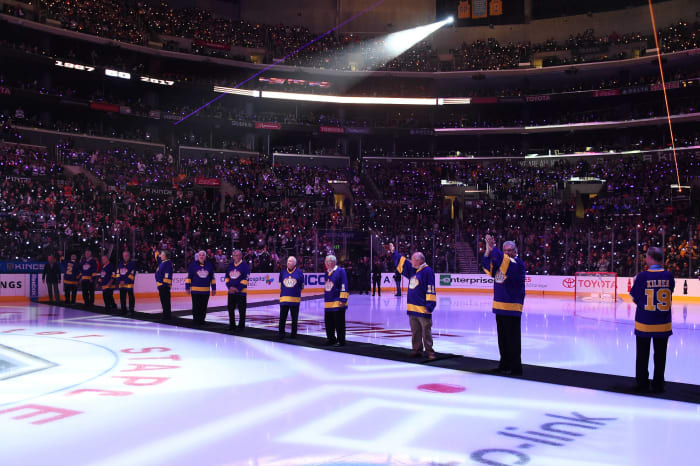
Andrew D. Bernstein/NHLI via Getty Images
With the first pick in franchise history, after the NHL expanded from six to 12 teams, the Kings drafted Pagnutti. He never played a single game in the NHL. Not one. Oh, he played in the minors for 10 years though. That’s what we call a wasted pick.
57 of 60
1966: Barry Gibbs, D, Boston Bruins
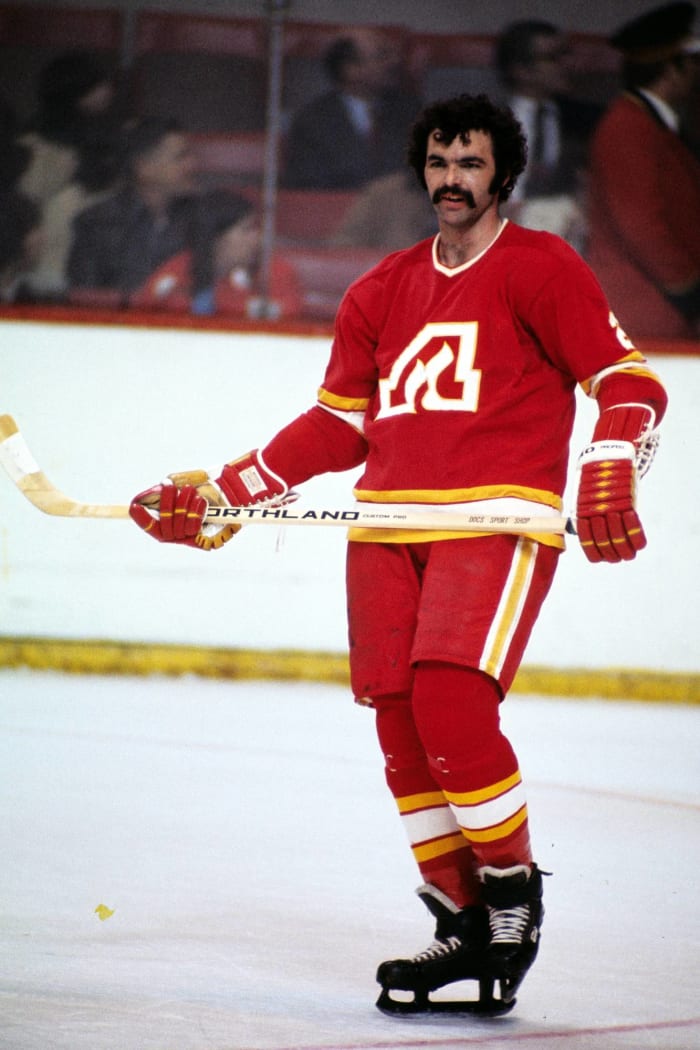
Steve Babineau/NHLI via Getty Images
Not to be confused with Barry Gibb of the Bee Gees, Gibbs played only a few games for the Bruins. He mostly played for the North Stars, and he had some decent years in Minnesota. The defenseman finished his career with 282 points in 797 games. As a defenseman in that era, he may just narrowly avoid the bust label by a hair.
58 of 60
1965: Andre Veilleux, RW, New York Rangers
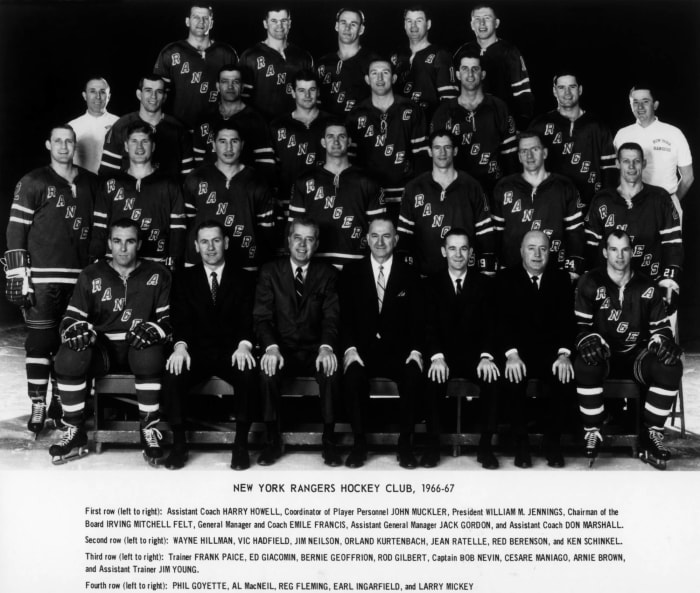
B Bennett/Getty Images
Veilleux doesn’t avoid the bust label. He never played professional hockey. Not at all. Not in the NHL, not in the minors. He just simply stopped playing hockey despite being the first-overall pick.
59 of 60
1964: Claude Gauthier, RW, Detroit Red Wings

Bruce Bennett Studios via Getty Images/Getty Images
And here we have another guy who never played in the NHL. That means that three of the first five players to be taken with the first pick of the NHL Draft didn’t play in the league. What were these teams doing?
60 of 60
1963: Garry Monahan, C, Montreal Canadiens

B Bennett/Getty Images
Monahan didn’t debut until the 1967-68 season, but that wasn’t so bad, given that he was drafted as a 16-year-old then played in the juniors. Either way, he was the first player ever taken in the NHL Draft. Monahan played several years for the Maple Leafs and then joined the newly minted Vancouver Canucks for a few seasons. He finished with 285 points in 748 games and also played in Japan in the ‘80s. From being the inaugural first-overall pick to playing in Japan, Monahan had a fascinating career.
